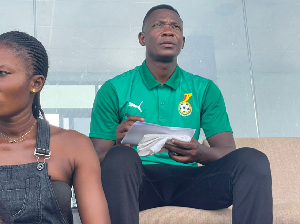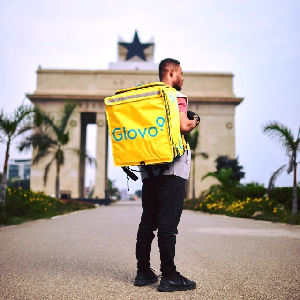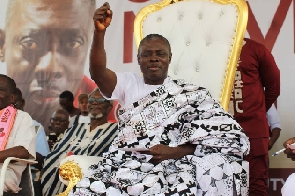General News of Friday, 15 August 2003
Source: GNA
Ex-WO says he was retired because he defied persuasion to vote for NDC
Sekondi, Aug. 15, GNA- An ex-Warrant Officer Class One of the Ghana Armed Forces (GAF) on Friday told the National Reconciliation Commission (NRC) at its sitting at Sekondi of how his stand against the persuasion of troops in peacekeeping operations in Cambodia to vote for the NDC in 1996, led to his premature discharge from the Army.
WO/I Emmanuel Koranteng said Major-General Akafia and Lt. Col. E.K.T. Donkor led a delegation from Ghana to meet the troops and introduced to them proxy forms that they asked to fill and indicate the political party they would vote for on the forms.
He said Lt-Col Blood Adzraku, of the Directorate of Public Relations at that time told them to vote for the NDC because "the devil you know is always better than the Angel you don't know".
He said they were further told to write letters that would be delivered by the delegation to their spouses and other relations at home to vote for the NDC, and that when he stood up against it, Col. Adzraku asked him if he wanted to incite the troops against a military order. WO/I Koranteng said he refused to fill the proxy forms and when asked what party he would vote for, he told them that his vote was secret.
When the batch arrived in the country in 1997, the witness said he was asked to proceed on his terminal leave even though he had not requested for it, as had been the practice.
WO/I Koranteng said when he complained to Maj-Gen Agyemfra, the then Chief of Staff about the issue, he expressed surprise at the decision and directed him to see the records officer but he could not do so because he was told the officer had travelled outside the country. He said he had to leave to Assakai, near Takoradi where operates a corn mill "to make ends meet".
He said his colleagues most of whom he was with in Cambodia were honourably discharged in 2002, with all their benefits paid to them. WO/I Koranteng said even though he had served the Ghana Armed Forced for 26 years at the time that he was discharged, the process applied to him was wrong because he had the option like others to stay on and applied to be discharged.
He appealed to the Commission to recommend the restoration of all his benefits and adequately compensated.
Mr Abdul Rhaman Obeng, a farmer at Assin Nsuta told the Commission that in 1982, as he was preparing to go to his farm, the chief of the town summoned the people to a meeting.
He said when he arrived, there was a soldier at the palace who ordered him and other young men to sleep on the ground and look at the sun because they arrived late.
The soldier ordered all the women to leave while he asked the men to slap themselves.
Mr Obeng said the soldier who was accompanied by three others tortured them before they were asked to leave. He said since then he could not work to cater for his wife and five children and asked for compensation.
Mr Frank Okyere, resident at Anaji, Takoradi told the Commission that in June 1979, he worked with the work service engineers and at one time detailed for a job in the house of the late General Akuffo. He said during the coup that overthrew him as Head of State, guns were shot at the direction of the house and he and others were asked to leave through the emergency gate but he was hit in the right arm while one Botwe died from gun shot wounds.
He said as a result, he could not do any meaningful work even though he underwent surgical operation three times. His objective to further his education was also curtailed.
Mrs Theresa Krakue, a resident of Kweikuma near Sekondi who operated a provision store in 1984, told the Commission of how four soldiers tortured her and took all her items that included bags of sugar, rice, corned beef and tinned fish to the Air Force Station in Takoradi, on suspicion of hoarding.
They sold the items and took away the proceeds.
She said she and other traders were kept in a guardroom flooded with water, compelling them to stand on their feet for three days. As a result she lost her capital and now doing petty trading. Lt. Gen. Emmanuel Erskine, a member of the Commission at this juncture remarked that he had commanded troops for many years and that he was ashamed anytime he heard stories of brutalities by young soldiers.
Mr Peter Kofi Atta Kakra, also a witness, told the NRC that he spent two and half years in detention and in prison for listening to a sermon by one Evangelist Twumasi.
He said he was learning carpentry in the early 1980s and frequently went to the Star Hotel area in Takoradi to listen to the sermons of the Evangelist.
He said on June 6, 1988 around 7:00pm, while Evangelist Twumasi was preaching, he asked the listeners if any of them had a question. Witness said some people in the crowd accused the Evangelist of insulting the President J J Rawlings and this nearly led to confusion and the service had to end abruptly.
He said on his way home, he saw three policemen being led by a young man and as soon as they reached where he was, they asked him to follow them but when he declined, they beat him up and later sent him to the police station.
He said four other policemen at the station joined in the beating before locking him in the cells.
Mr Kakra said two others who patronised Evangelist Twumasi's sessions were also locked up at the station.
He told the commission that the Evangelist on hearing of their arrest solicited the assistance of one Mr. C. K. Boateng to facilitate their release but they were also arrested and locked in the cells.
Mr Kakra said they spent ten days in police cells and then flown to the Police Headquarters in Accra for interrogation. He said Evangelist Twumasi was later sent to the BNI headquarters while the four others were sent to the BNI Annex, near the 37 military hospital.
Mr Kakra said they were released in a week's time but were re-arrested, three months after and sent to the Kweikuma BNI office for interrogation.
They were again sent to the BNI Annex in Accra and detained for a long time and finally sent the James and Ussher Fort Prisons, he said. Mr Kakra said he spent ten months at the James Fort prison with Evangelist Twumasi, who was frequently tortured.
They were again transferred to Takoradi where they were tried and sentenced to one year and two years jail term in hard labour respectively "for insulting President Rawlings".
Mr Joseph Kankam, unemployed, told the Commission that his nephew WO/I Kingsley Sarpong, was shot by unidentified soldier and that he could not find the reason for such act.
He said on Jan. 3, 1982, he was at Ewusiejo in the Western Region when he had information that Mr Sarpong who was also a Regimental Sergeant Major (RSM) had been shot at the Apremdo Mystery Church. Mr Kankam said on his arrival at the scene, he was told that RSM Sarpong had been rushed to the Effia Nkwanta Hospital in critical condition, and so he followed up but on reaching the hospital, he was told RSM Sarpong was dead.
"I therefore sent his wife and children to live in Kumasi and I am pleading with the Commission to assist the family with some form of compensation", Mr Kankam added.
Mr David Namlepigya Appiah, a resident at Effiakuma, said on January 21, 1982, he was standing near a former GNTC building in Takoradi when he saw four armed soldiers drilling and shooting a young man around the Zenith Hotel, but since he was a little far from the scene, he could not identify the victim.
He said at dawn the following day, his senior brother came to inform him that one Kofi Bugaya had been killed at the Zenith area.
Mr Appiah said the family contacted the Police who gave the approval for the corpse to be taken away from the Mortuary. He told the Commission that on that fateful day, there were several corpses at Effiakuma, Kwesiminstim, Takoradi and New Takoradi roundabout, but did not know what happened.
Mr Appiah said Kofi Bugaya's girlfriend was pregnant at the time of the incident while his father died three months later due to trauma. Another witness, Madam Susana Koomson, who dealt in clothes, told the Commission that she arrived at her shop at the Takoradi market on the morning of June 4, 1979 to find the entire place empty.
She said after investigations, her colleague traders told her that there had been a coup and just then, soldiers appeared on the scene and called three of the women and asked them to lead them to where they kept their wares.
Madam Koomson said she had gone to Accra to purchase several types of clothes on June 2, and was made to carry them into a waiting military vehicle.
She told the commission that several other traders and their wares were loaded on the vehicle until it was full after which they were driven to the Apremdo barracks. Madam Koomson said at the barracks, they were made to sit on the floor and stare at the sun from 11:30am till 8:00pm, when they were released and asked to report again on Monday. She said when they reported on the following Monday, they were made to carry the goods into a waiting military vehicle, which conveyed them to the regional administration where they were sold at "controlled" price. She told the Commission that she received 141 cedis as proceeds from the sale of the items estimated at about 20,000 cedis. Madam Koomson said on three occasions, soldiers sold her wares at controlled price and this made her and her seven children paupers.
Mr Peter F. Y. Barnes, resident at Appiah-Ajumako in the Central Region, said his uncle one Col. Enninful was the chairman of the Committee, which tried Flt-Lt J. J. Rawlings in 1979.
He said on June 2, 1979, Col Enningful visited his brother one Kofi Kuma in Accra, and his stay run into the June 4 coup, during which he was shot with his wife in his house.
Mr Barnes said Col Enninful had three children when the incident occurred and appealed to the Commission to assist the family and children financially.
Friday's sitting ended the commission's hearing of petitions from witnesses from the Western and Central regions, which began on August 5. Within the past ten days, it heard 71 cases of Human rights abuses including abductions, unlawful seizure of property, killings and tortures. It was the third of its deliberations outside Accra after hearing witnesses at Kumasi and Tamale. 15 Aug. 03










